Micro Chips was a Mexican children's rock music group active from 1987 to 1993.

Mœnia is a Mexican electronic/synthpop/ambient group. Popular within the Latin club scene while simultaneously pioneering a darker, more experimental, more poetic side of Spanish-language electronica, Mœnia has had three top-20 hits. Mœnia is often considered one of the first successful experimental Mexican music composers and performers, finding commercial viability in a market normally dominated by Latin ballad crooners, teenage vocal groups and musical styles with more mass appeal like cumbia, reggaeton and ranchera. Mœnia is also popular in other parts of Latin America, including the Argentinian and Chilean music markets, where they have also charted. Some of their most recognized singles include "Estabas Ahí", "No Dices Más" and "Manto Estelar".
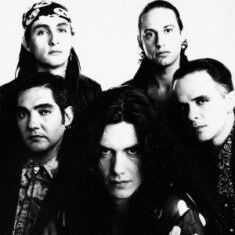
Caifanes is a Mexican rock band formed in Mexico City in 1986. The group achieved commercial success during the late 1980s and early 1990s. The original lineup of members consisted of Saúl Hernández, Sabo Romo (bass), Alfonso André (drums) and Diego Herrera. Alejandro Marcovich later joined as lead guitarist. Caifanes' style can be described as a hybrid of British new wave, progressive rock and Latin percussion underscored by deep, somber and Latin American-Mexican Spanish-influenced lyrics and the vocal style of Saúl Hernández. Members of Caifanes have cited The Cure, The Beatles and King Crimson as major influences. Adrian Belew produced their third studio album, El Silencio, and made a guest appearance on the track Piedra.

Molotov is a Mexican rock band formed in Mexico City in 1995. Their lyrics, which are rapped and sung by all members of the group, feature a mixture of Spanish and English. The band members also switch instruments and roles depending on what song they are performing. Most of the group's songs are best known for their content of political satire and social criticism towards the Mexican government and society, which lead them to be a subject of censorship at the beginning of their career. Molotov are one of the best-selling Latin bands of all-time, having sold more than four million copies of their albums worldwide. Although some media outlets describe them as one of the most irreverent in their genre, they are still considered one of the best in contemporary rock en español.

Fobia is an album released by Mexican pop rock band Fobia. Their self-titled debut album was released in 1990. The songs are primarily themed around common phobias and anxieties, filled with dark humor and melodic music. Songs like Los muñecos and Las moscas deal with the fear of dolls and flies respectively. Other songs like Dios bendiga a los gusanos and El crucifijo deal with the anxieties of love. El microbito delivers humor and a quick change of pace towards the album's finale.

Mundo Feliz was the second album released by Mexican rock band Fobia in 1991.

Leche is an album released by Mexican rock band Fobia. The word "Leche" means Milk in Spanish. This was their third album.
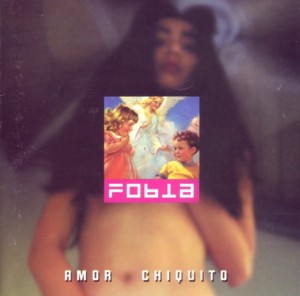
Amor Chiquito is the fourth album released by Mexican rock band Fobia on December 22, 1995. Of previous albums, "Amor Chiquito" possesses a broader range of melodies, from Hard Rock tunes, to more melodic themes, to pop songs like "Sin querer". Fobia's signature sound does not change, staying true to its eclectic lyrics full of surreal imagery. Ten more years would pass before Fobia would sit together again to record another LP.
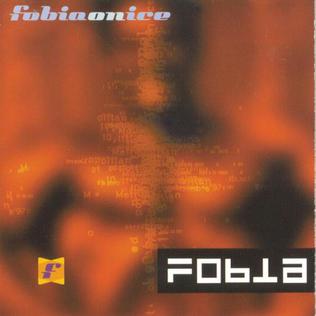
Fobia on Ice was a live album released by Fobia, a Mexican rock band on December 16, 1997. After Fobia's first live album, band members Leonardo de Lozanne, Paco Huidobro, Cha!, and Iñaki, Jay de la Cueva, would part ways without formally breaking up until recording together again in 2004.

Wow 1987-2004 is a Spanish language rock and roll greatest hits album by Mexican band Fobia. This is Fobia's first recording of any type since 1997's Fobia on Ice. This anthology compiles Fobia's greatest hits from their first five albums Fobia (1990), Mundo Feliz (1991), Leche (1993), Amor Chiquito (1995), and Fobia on Ice (1997), along with two new songs.

Rosa Venus is a Rock en español album recorded by Mexican rock band Fobia. The album was released on July 26, 2005. Songs include "Hoy tengo miedo", previously recorded their previous album Wow 87*04, No eres yo, and 200 Sabados. This is Fobia's first full-length album since Amor Chiquito of 1995.

Saúl Alfonso Hernández Estrada, is a Mexican musician, writer, poet, songwriter and the lead singer of Jaguares and Caifanes, two prominent Mexican rock en español bands.

Titán or TITAN is a Mexican electronic band formed in 1992 from the industrial band Melamina Ponderosa, where Emilio Acevedo and Julián Lede first met each other, later Jay de la Cueva joined the band. They have released four albums, the most recent, Dama in 2016.

Caifanes: La Historia is a compilation album by Mexican rock band Caifanes released almost two years after their sudden breakup. Singles from 1987 to 1994, including two previously unedited live recordings are included in this 24-track album. Disc 1 contains singles from 1987 to 1990; disc 2 contains singles from 1992 to 1994.
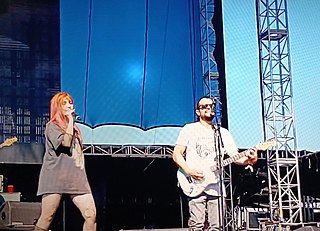
Jotdog is a Mexican pop band formed in Mexico City in 2009. The group consists of María Barracuda, born Maricela Morales Rodríguez, and Jorge "La Chiquis" Amaro ; formerly Jotdog's sound is indebted to the electronic era but eventually grew to incorporate influences from many genres of popular music. They have maintained a recognisable sound built on melodic instrumentals, highlighted by Amaro's music and Barracuda's expressive vocals. Their lyrics focus on personal themes such as unrequited love.

Jotdog is the debut studio album by Mexican group Jotdog. It was released on 2009 by Sei Track. The album is produced and arranged by Jorge "Chiquis" Amaro, with lead vocals by María Barracuda. The songs are mostly inspired by unrequited love, and deals with romantic relationships from different points of view. Musically, the album drew inspiration from '80s electropop and synthpop while incorporating dance music and clear hooks. The album received positive reviews, with critics commending Amaro's production and Barracuda's lyrics, and comparing their lineup and musical style to the bands Garbage and Mecano. The singles from Jotdog, "Hasta Contar a Mil", "Resistir" and "Las Pequeñas Cosas", were well received by the audience. Jotdog promoted the album by performing the songs in a number of live appearances. Jotdog was re-released with a bonus DVD with additional features and received nominations for the Premios Oye! and the Latin Grammy Awards.

20 Años de Éxitos En Vivo con Moderatto is the third live album by Mexican recording artist Alejandra Guzmán. It was released by EMI Latin on June 21, 2011, and features the participation of Moderatto as her backing band. Jay de la Cueva worked as producer of the album, which was recorded at the Palacio de los Deportes in Mexico City on March 17, 2011. The album includes Guzmán's greatest hits, a song originally performed by Moderatto, and two newly recorded songs, including the theme song of the Mexican telenovela Una familia con suerte.
Rock en tu idioma was a publicity campaign -- resulting in a series of rock albums -- initiated by the BMG Ariola music label, which other labels later also joined, to promote and distribute the music of Mexican, Spanish and Argentine bands. Between 1986 and 1991 the campaign was part of a musical movement in Latin America, and of the boom that arose from what became known as the Movida Madrileña.
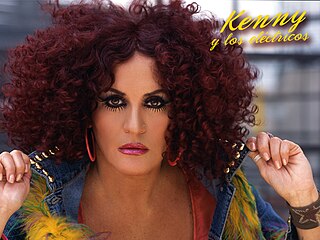
Kenny y los Eléctricos is a rock band founded in 1980 by the singer and band leader Kenny Aviles, who has been called "the mother of Mexican rock". The band started in Los Angeles, where they made their first public appearances under the name Kenny and The Electrics, playing in venues like Whisky a Go Go. They moved back to Mexico in 1980 and went on to be considered an internationally important Mexican rock band, emblematic of Mexican rock in the 1980s.

















